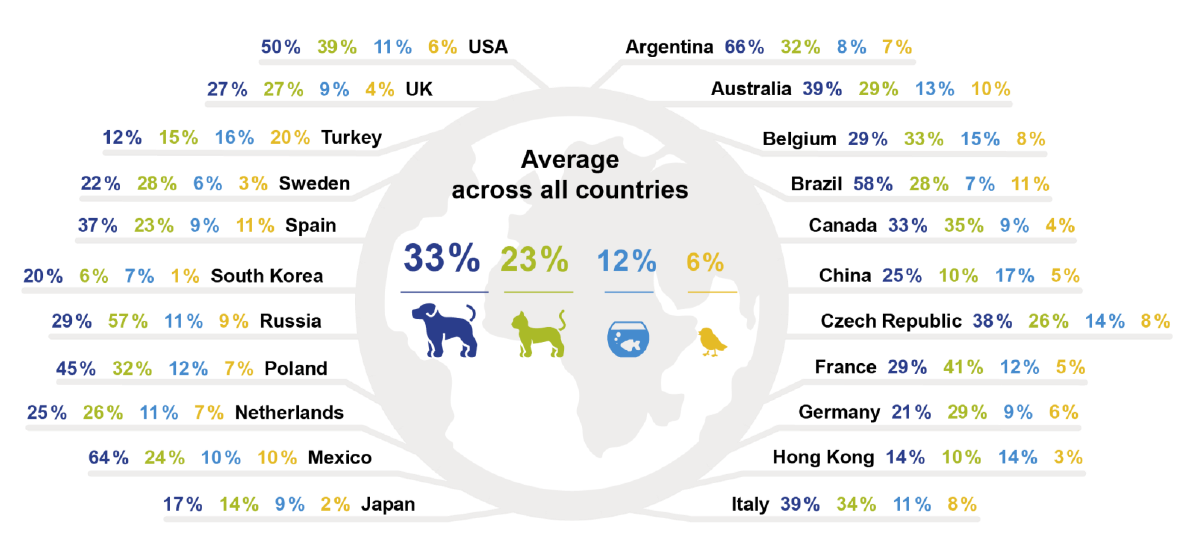I live on an island that is famous for quite a few things, among them the apparent love affair between its human and canine inhabitants. According to an English journalist writing for a mainstream newspaper, “Many Englishmen reserve their deepest feelings for dogs and other dumb beasts.” (Her words, not mine).
According to another journalist, the Queen’s corgis, which have been described as a “moving carpet” preceding her as she walks round her royal residences, have become almost as emblematic of the British crown as their famous owner.
Notwithstanding the royal endorsement and popular stereotypes, the UK does not actually rank very high in terms of per capita dog ownership. The results of a survey by market researchers are shown in the figure below: Dog ownership is represented by the dark blue numbers.

What explains the attraction that humans have towards dogs? Why do dogs, seemingly, also love humans in return?
From tomorrow (3 December 2018) onward, the next digital event of the Psychonomic Society, #caninecog, will take up those issues. The Digital Event was triggered by a recent special issue of the Psychonomic Society’s journal Learning & Behavior. The special issue comprises around 20 articles that are “entirely devoted to the cognitive (and sensory) abilities of dogs (Canis lupus familiaris).”
The special issue is explained thus:
“There are, of course, many practical reasons for bringing dogs to the forefront. The species’ enormous impact on society, spanning a range from man’s best friend to “bad dogs” is evident, as is the practical importance of a better understanding of the variables controlling dog behavior for the growing number of industries that utilize the behavior of domestic dogs. But there is also much to learn about dog’s learning abilities. Although dog research has a long history, with the studies of Darwin, Lubbock, and Pavlov as famous historical examples, there are still many gray areas, with ambiguous evidence and hypotheses under revision.”
The articles in this issue will remain free to access by the public for a month (until the end of the year). Here is the list of contributions:
- Editorial, Jeffrey S. Katz and Ludwig Huber
- Domesticated dogs (Canis familiaris) tend to follow repeated deceptive human cues even when food is visible, Candice Dwyer and Mark R. Cole
- In what sense are dogs special? Canine cognition in comparative context, Stephen E.G. Lea and Britta Osthaus
- Effect of age on discrimination learning, reversal learning, and cognitive bias in family dogs, Patrizia Piotti et al
- Individual performance across motoric self-regulation tasks are not correlated for pet dogs, Alizee A.A. Vernouillet et al
- What influences a pet dog’s first impression of a stranger?, Jingzhi Tan et al
- Truth is in the eye of the beholder: Perception of the Müller-Lyer illusion in dogs, Benjamin Keep, Helen E. Zulch, and Anna Wilkinson
- Any reward will do: Effects of a reverse-reward contingency on size preference with pet dogs (Canis lupus familiaris), Jonathan K. Fernand et al
- Dogs do not demonstrate a human-like bias to defer to communicative cues, Angie M. Johnston Yiyun Huang, and Laurie R. Santos
- Inequity aversion in dogs: a review, Jim McGetrick and Friederike Range
- Timmy’s in the well: Empathy and prosocial helping in dogs, Emily M. Sanford, Emma R. Burt, and Julia E. Meyers-Manor
- Similarity between an unfamiliar human and the owner affects dogs’ preference for human partner when responding to an unsolvable problem, Orsolya Kiss et al
- Would dogs copy irrelevant actions from their human caregiver?, Ludwig Huber et al
- Orienting asymmetries and physiological reactivity in dogs’ response to human emotional faces, Marcello Siniscalchi, Serenella d’Ingeo, and Angelo Quaranta
- More evidence that less is better: Sub-optimal choice in dogs, Rebecca J. Chase and David N. George
- Incidental spatial memory in the domestic dog (Canis familiaris), Christina M. Sluka et al
- Behavioral synchronization and affiliation: Dogs exhibit human-like skills, Charlotte Duranton and Florence Gaunet
- Separate brain areas for processing human and dog faces as revealed by awake fMRI in dogs (Canis familiaris), Andie M. Thompkins
- Revisiting the famous farm foxes: A psychological perspective, Jonathan D. Lane
- Rapid eye movement density during REM sleep in dogs (Canis familiaris), Enikő Kovács, András Kosztolányi, and Anna Kis
The Society’s next digital event, #caninecog, will discuss some of the papers in the special issue. The following posts, listed in the likely order of their publication, will contribute to the event from Monday (3 December) onward:
- Guest editors Jeffrey S. Katz and Ludwig Huber will provide an overview of the special issue.
- Shannon Kundey will ask whether dogs really understand us and care about us.
- Péter Pongrácz will ask how dogs manage to handle the many strangers among their human companions.
- William Roberts will examine whether dogs have a theory of mind.
- Lucia Lazarowski will explore dogs’ famous loyalty to humans.
Much to look forward to—please tune in for all of next week.
